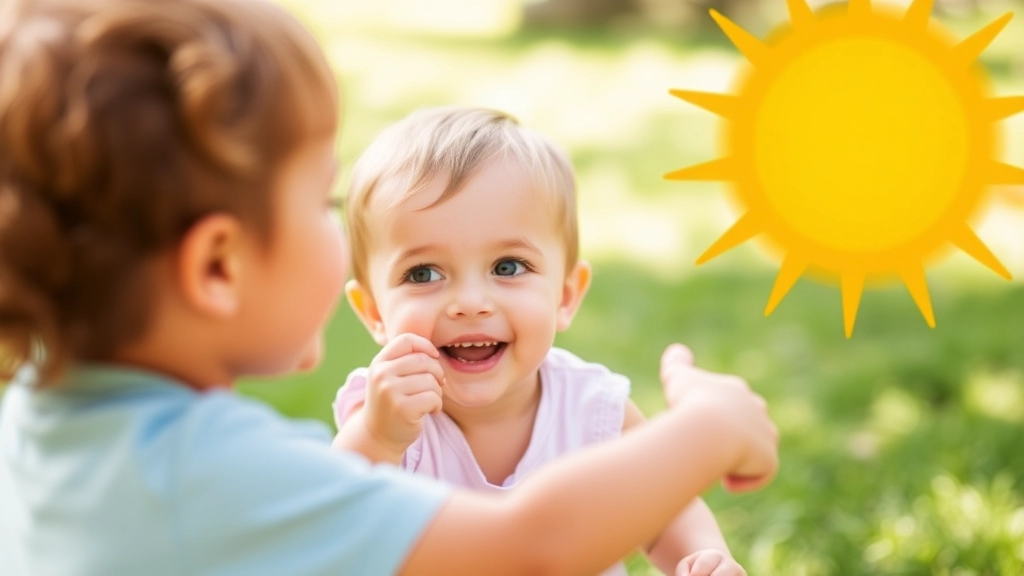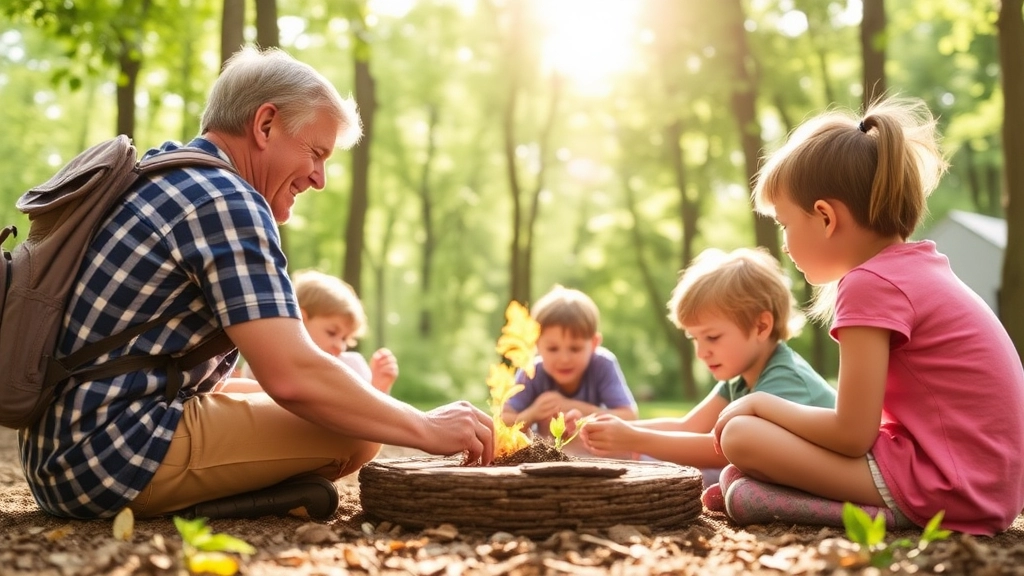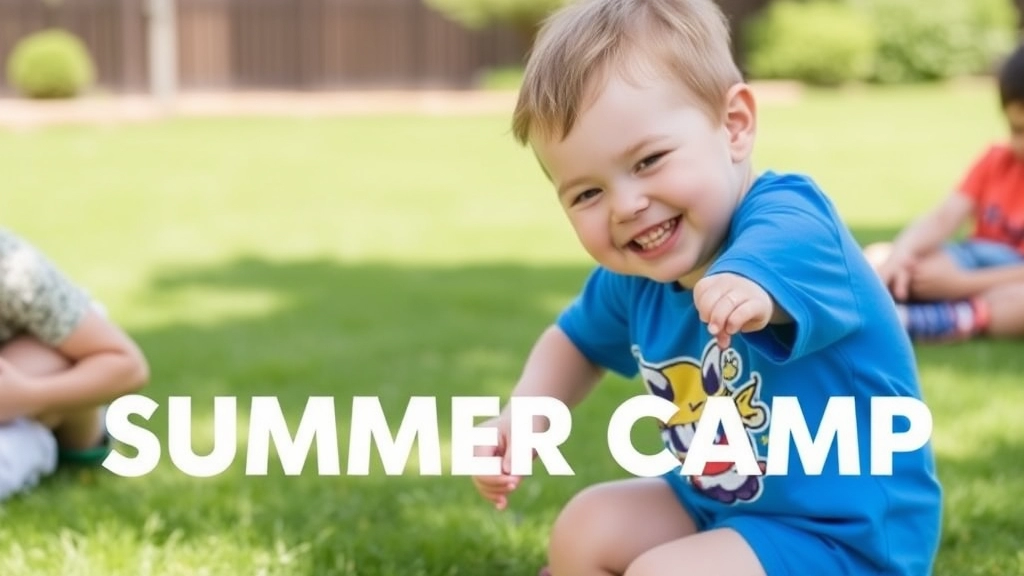Choosing the Right Summer Camp for 2-Year-Olds
Choosing the right summer camp for 2-year-olds can be a daunting task for any parent, but it doesn’t have to be. In this article, we break down everything you need to know to make an informed decision. From understanding your toddler’s unique needs to exploring the various types of camps and activities available, we’ve got you covered. Plus, we’ll share some real-life experiences and practical tips to ensure your child has a safe, fun, and enriching summer camp experience.
Key Benefits of Summer Camps for Toddlers
We’ll also delve into the key benefits of summer camps for toddlers, including:
- Social Skills Development
- Increased Physical Activity
- Building Independence and Confidence
Safety and Supervision
Safety and supervision are paramount, so we’ll outline what to look for in a camp’s safety measures and staff qualifications.
Preparing Your Child for Camp
Finally, we’ll provide a comprehensive guide on how to prepare your child for camp and answer some frequently asked questions to ease any concerns you might have. Ready to find the perfect summer camp for your little one? Let’s dive in!
Choosing the Right Summer Camp for Toddlers
Alright, let’s dive right in. Choosing the right summer camp for toddlers can feel like a daunting task. We all want the best for our little ones, right? You might be asking yourself, “Is my 2-year-old ready for camp?” or “What should I even look for in a toddler camp?” Trust me, you’re not alone in this. Let’s break it down together.
Understanding Your Toddler’s Needs
First things first, every toddler is unique. What works for one might not work for another. Here’s what you need to consider:
- Age-appropriate activities: Make sure the camp offers activities suitable for 2-year-olds. You don’t want them overwhelmed or, worse, bored.
- Social Interaction: Camps should encourage social skills through group play and activities. It’s a great way for your child to make new friends.
- Comfort Level: Your toddler should feel safe and comfortable. Look for camps that offer a nurturing environment.
Types of Camps
There are different types of camps out there, each catering to various needs and interests. Here are a few:
- Day Camps: These are perfect if you want your toddler to have a structured day but still come home in the evening.
- Specialised Camps: Some camps focus on specific activities like arts and crafts, music, or sports.
- Nature Camps: These are great for kids who love the outdoors. They offer activities like nature walks and animal interactions.
What to Look For
When you’re scouting for the perfect camp, keep these pointers in mind:
- Qualified Staff: Ensure the camp employs experienced and trained staff. They should know how to handle toddlers with care and patience.
- Safety Measures: Check if the camp follows strict safety protocols. This includes childproofing, first-aid availability, and emergency plans.
- Cleanliness: The camp should maintain high hygiene standards, especially in play areas and restrooms.
- Parent Reviews: Look for reviews from other parents. They can give you real insights into what to expect.
Real Talk: My Experience
When I was searching for a camp for my own little one, I was overwhelmed by the options. I remember visiting a camp that looked perfect on paper but felt off in person. The staff seemed disinterested, and the facilities were not up to the mark. Trust your gut. If something feels wrong, it probably is.
Making the Decision
After you’ve done your research and visited a few camps, it’s decision time. Here’s a quick checklist to help you out:
- Does the camp meet your child’s needs?
- Is the staff qualified and caring?
- Are safety and cleanliness prioritised?
- Do other parents recommend it?
Remember, the goal is to find a place where your toddler can have fun, learn new things, and feel safe. The right summer camp can offer all that and more.
If you are looking for a camp that combines fun and learning, check out KinderCare Summer Camp. For those interested in a more specialized experience, consider the Art Summer Camps which offer a creative outlet for young minds.
Key Benefits of Summer Camps for 2-Year-Olds

Alright, let’s talk about the key benefits of summer camps for 2-year-olds.
Why should you even consider sending your toddler to camp?
It’s a valid question.
Parents often worry about whether their little ones are ready for such an experience.
But here’s the scoop: summer camps can be game-changers for toddlers.
Social Skills Development
First off, social skills.
At two, kids are just starting to interact with others.
Camp offers a structured environment for them to learn how to share, take turns, and communicate.
Think of it as a mini social boot camp.
Physical Activity
Next up, physical activity.
Most camps are packed with activities that get kids moving.
From running around to simple obstacle courses, these activities help improve their motor skills.
Plus, it tires them out, which means better sleep for everyone. Win-win.
Independence and Confidence
Then there’s independence and confidence.
Yes, even at two, kids can start to build these traits.
Being away from home, even for a few hours, helps them get used to new environments and people.
It’s like giving them a tiny taste of independence.
Exposure to New Experiences
Another biggie is exposure to new experiences.
Camps often introduce toddlers to things they don’t usually encounter at home.
Whether it’s a new craft, a different game, or even just being outside more, these new experiences are invaluable.
Routine and Structure
Lastly, let’s not forget about routine and structure.
Camps follow a schedule, which can be great for toddlers who thrive on routine.
It helps them understand the concept of time and what to expect next.
Real Talk: Stories from Parents
Let me share a quick story.
A friend of mine was hesitant about sending her 2-year-old to camp.
She worried her child would be too young to benefit.
But after just a week, she noticed her daughter was more confident, more active, and even started using new words she picked up at camp.
It was a total game-changer for their family.
Types of Activities to Expect
Alright, let’s get into the nitty-gritty. What kind of activities can you expect at a summer camp for your 2-year-old? This is where the magic happens, and trust me, it’s not just about keeping them busy. It’s about growth, fun, and learning all rolled into one.
Indoor Activities
Arts and Crafts: Remember those days when you could spend hours just colouring or making stuff with Play-Doh? Camps for toddlers often have arts and crafts sessions where kids can express their creativity. Think finger painting, collage-making, and simple DIY projects. For more ideas, explore our summer camp craft ideas for all ages.
Story Time: Who doesn’t love a good story? Camps usually have dedicated story times where kids can listen to engaging tales. This not only entertains them but also helps in developing their listening skills and imagination.
Music and Dance: Toddlers love to move, and music and dance sessions are perfect for letting them groove to their favourite tunes. It’s a great way to burn off some energy and improve their motor skills.
Outdoor Activities
Nature Walks: Simple, yet effective. Nature walks give toddlers a chance to explore the world around them. They’ll learn about different plants, insects, and maybe even spot some birds. It’s a mini-adventure every time.
Water Play: When it’s hot, nothing beats splashing around in the water. Many camps have small pools or water play areas where kids can enjoy some supervised fun. It’s safe, and it’s a blast.
Sports and Games: Think mini football, tag, or simple obstacle courses. These activities help toddlers develop coordination, teamwork, and social skills. Plus, they’re just plain fun. Discover more about how sports can benefit your child at our fun activities at summer camp guide.
Sensory Activities
Sand Play: Ever noticed how kids can spend hours playing in the sand? Camps usually have sandboxes where kids can dig, build, and explore textures. It’s a tactile experience that’s both calming and stimulating.
Sensory Bins: These are containers filled with various materials like rice, beans, or pasta. Toddlers can dig their hands in and explore different textures, which is great for sensory development.
Learning Activities
Counting Games: Simple counting games and activities can help toddlers start to understand numbers. It’s not about getting it perfect but about making learning fun.
Shape and Colour Recognition: Activities that involve sorting shapes and colours help toddlers develop their cognitive skills. Think of it as a playful way to introduce basic concepts.
Social Activities
Group Play: Camps often have group activities where kids can interact with each other. This helps them develop social skills like sharing, taking turns, and communicating.
Role-Playing Games: Simple role-playing games, like pretending to be a doctor or a chef, can be incredibly beneficial. They help toddlers understand different roles and develop empathy.
Got more questions? Check out our FAQ section or dive into our tips for selecting the perfect camp for your toddler.
Safety and Supervision Considerations

Alright, let’s get real. When it comes to sending your 2-year-old to a summer camp, safety and supervision are top of mind.
Is my toddler going to be safe? Will they be properly supervised?
These are the burning questions we all have. And rightly so.
Safety First
The keyword here is “safety.”
We don’t want any accidents or mishaps, right?
So, here’s what you need to look out for:
- Staff-to-Child Ratio: Ideally, you want a low ratio. Think 1 adult for every 3-4 toddlers. More eyes on your kid means less chance of trouble.
- Qualified Staff: Are the staff members trained in first aid and CPR? Do they have experience with toddlers? This isn’t just a nice-to-have; it’s a must.
- Secure Environment: The camp should have secure entrances and exits. No wandering off allowed.
- Emergency Procedures: Ask about their emergency protocols. Do they have a plan for injuries or other emergencies? Knowing this can give you peace of mind.
Supervision
Supervision is just as critical.
You don’t want your toddler to be left unattended, even for a minute.
Here’s what to check:
- Constant Monitoring: Staff should be actively engaging with the kids, not just watching from a distance.
- Structured Activities: Camps with a well-planned schedule keep kids busy and out of trouble. Boredom can lead to mischief.
- Regular Check-ins: Some camps offer updates throughout the day. This could be through an app or text messages. It’s a great way to stay connected and reassured.
Real Stories
I remember when my friend Sarah sent her 2-year-old to a summer camp.
She was a nervous wreck.
But the camp had such tight safety measures and constant supervision that she felt at ease within a few days.
The regular updates and photos helped too.
Preparing Your Child for Camp
So, you’re thinking about sending your 2-year-old to summer camp? That’s awesome! But I get itâthere are a million questions racing through your mind. Is my toddler ready? Will they enjoy it? How do I even start preparing them for this new adventure?
Getting Your Toddler Ready: The Basics
First things first, you’ve got to know your child. Are they comfortable being away from you for a few hours? Do they enjoy playing with other kids? If the answer is yes, you’re on the right track. But if not, don’t panicâthere’s still time to get them ready.
Ease Them Into It
Start small. You don’t want their first day at camp to be the first time they’re away from you. Try these steps:
- Playdates: Arrange a few playdates where you leave them with a trusted friend or family member.
- Short Separations: Gradually increase the time you’re apart. Start with short trips to the shop and work your way up.
- Talk About Camp: Make it sound exciting. Tell them about the fun activities they’ll do and the new friends they’ll make.
Addressing Common Concerns
What If They’re Anxious?
It’s normal for kids to feel anxious about new experiences. Here’s what you can do:
- Visit the Camp: If possible, take a trip to the camp before it starts. Let them see where they’ll be playing and meeting new friends.
- Familiar Items: Pack a favourite toy or blanket. Something familiar can provide comfort.
What About Safety?
Safety is a biggie, right? Make sure they know:
- Who to Talk To: Teach them to identify camp leaders and who they can go to if they need help.
- Basic Rules: Explain simple rules like staying with the group and not wandering off.
Packing for Camp
Packing might seem trivial, but it can make a big difference:
- Label Everything: Toddlers lose stuff. A lot. Make sure everything is labelled.
- Appropriate Clothing: Pack for the weather and activities. Think sun hats, extra clothes, and a raincoat.
- Healthy Snacks: If the camp allows, pack some snacks. It can be reassuring for them to have something familiar to munch on.
For more tips on making your child’s camp experience memorable, check out our guide on Family Summer Camp: Top Tips and Destinations. Additionally, discover some Indoor Summer Camp Activities for Kids to keep the fun going even when they’re back home.
Tips for Parents on Selecting a Camp

Choosing the right summer camp for your toddler can feel like a massive decision. You want them to have fun, stay safe, and maybe even learn a thing or two. But how do you make the call? Here are some tips to help you out.
1. Check the Camp’s Reputation
- Reviews and Testimonials: Read what other parents have to say.
- Word of Mouth: Ask friends or local parenting groups.
- Accreditations: Look for camps accredited by reputable organisations.
2. Visit the Camp in Person
- Facilities: Are they clean and well-maintained?
- Staff: Do they seem friendly and competent?
- Safety Measures: What’s in place to keep your child safe?
3. Understand the Camp’s Philosophy
- Educational vs. Recreational: Some focus on learning, others on play.
- Structure: Is there a set schedule, or is it more free-form?
- Values: Do they align with what you want for your child?
4. Review the Activities Offered
- Variety: Look for a mix of indoor and outdoor activities.
- Skill Development: Are there opportunities for your child to learn new things?
- Fun Factor: Will your child enjoy what’s on offer?
5. Ask About the Staff-to-Child Ratio
- Low Ratios are Better: More staff means more eyes on your child.
- Qualifications: Are the staff trained in early childhood education and first aid?
6. Consider the Camp’s Location and Hours
- Proximity: Is it close to home or work?
- Hours: Do they fit your schedule?
- Transport Options: Is there a shuttle service or do you need to drive?
7. Budget Wisely
- Cost vs. Value: Is the price justified by what they offer?
- Hidden Fees: Are there extra costs for materials or special activities?
- Payment Options: Do they offer flexible payment plans?
8. Prepare Your Child
- Talk About It: Explain what camp is and what they’ll do.
- Visit Together: If possible, take your child to see the camp beforehand.
- Pack Together: Let them help pack their bag to build excitement.
Real Concerns, Real Solutions
Worried about separation anxiety? It’s normal. Start with shorter camps and gradually increase the duration.
Concerned about safety? Look for camps with robust safety protocols and well-trained staff.
Frequently Asked Questions About Toddler Camps
What Exactly is a Toddler Camp?
So, you’re thinking about sending your 2-year-old to a summer camp. But what does that even mean? Toddler camps are specially designed programmes for kids aged 2-4. They focus on fun, learning, and socialisation in a safe environment. Think of it as a mini-adventure for your little one.
Is My Child Too Young for Camp?
This is a common worry. Many parents wonder if their 2-year-old is ready for camp. The answer? It depends on the camp and your child. Some toddlers thrive in new settings, while others might need a bit more time. Camps often offer trial days, so you can test the waters before committing.
What Activities Will My Toddler Do?
Expect a mix of activities that are both fun and educational. Here’s a quick rundown:
- Arts and Crafts: Simple projects that spark creativity.
- Outdoor Play: Safe, supervised playtime to burn off energy.
- Story Time: Engaging tales that capture their imagination.
- Music and Dance: Rhythmic fun to get them moving.
How Safe Are These Camps?
Safety is a top priority. Camps should have:
- Qualified Staff: Trained in first aid and child development.
- Low Child-to-Staff Ratio: Ensuring your toddler gets the attention they need.
- Secure Facilities: Fenced play areas and childproofed spaces.
How Do I Prepare My Child for Camp?
Getting your toddler ready for camp can be a breeze:
- Talk About It: Explain what camp is and what they’ll do there.
- Visit the Camp: Familiarise them with the new environment.
- Pack Comfort Items: A favourite toy or blanket can make a big difference.
What Should I Look for in a Camp?
Choosing the right camp involves a few key steps:
- Research: Check out reviews and ask other parents.
- Visit: Tour the camp and meet the staff.
- Ask Questions: Inquire about safety measures, staff qualifications, and daily routines.
Can I Stay with My Child at Camp?
Some camps allow parents to stay for the first few days. This can help ease the transition. Others might have a strict drop-off policy. It’s best to ask beforehand.
How Much Does a Toddler Camp Cost?
Costs vary widely. Factors include location, duration, and activities offered. On average, you might spend anywhere from £100 to £500 per week. Always ask for a detailed breakdown of fees.
What If My Child Doesn’t Like It?
It happens. Not every child takes to camp immediately. If your toddler seems unhappy:
FAQs About Summer Camps for 2-Year-Olds
What are the key benefits of summer camps for 2-year-olds?
Summer camps offer numerous benefits for toddlers, including social skills development, increased physical activity, building independence and confidence, exposure to new experiences, and providing a structured routine.
How do summer camps help in developing social skills for toddlers?
Camps provide a structured environment where toddlers can learn to share, take turns, and communicate with others, serving as a mini social boot camp.
What types of physical activities are included in summer camps for 2-year-olds?
Activities often include running, simple obstacle courses, and other games that help improve motor skills and provide ample physical exercise.
How do summer camps promote independence and confidence in toddlers?
Being away from home for a few hours helps toddlers get used to new environments and people, giving them a tiny taste of independence and boosting their confidence.
What new experiences can toddlers be exposed to at summer camps?
Camps often introduce toddlers to new crafts, games, and outdoor activities that they might not encounter at home, providing invaluable new experiences.
Why is routine and structure important for toddlers at camp?
Following a schedule helps toddlers understand the concept of time and what to expect next, which is beneficial for those who thrive on routine.
What safety measures should I look for in a summer camp for my 2-year-old?
Ensure the camp has a low staff-to-child ratio, qualified staff trained in first aid and CPR, secure entrances and exits, and well-defined emergency procedures.
How can I be sure my toddler will be properly supervised at camp?
Look for camps where staff are actively engaging with the kids, have structured activities, and provide regular updates to parents throughout the day.
What should I consider when selecting a summer camp for my toddler?
Consider the camp’s reputation, visit the camp in person, understand its philosophy, review the activities offered, check the staff-to-child ratio, consider the location and hours, budget wisely, and prepare your child for the experience.
How can I prepare my child for their first summer camp experience?
Talk to your child about what camp is and what they’ll do, visit the camp together if possible, and let them help pack their bag to build excitement.
What should I do if I’m worried about separation anxiety?
Start with shorter camps and gradually increase the duration to help your child adjust to being away from home.
Are there any hidden fees I should be aware of when budgeting for camp?
Check if there are extra costs for materials or special activities and ask if the camp offers flexible payment plans.
References
-
Summer Camps for Toddlers: Are They Ready?
-
Choosing a Summer Camp for Your Toddler
-
Summer Camp Benefits for Toddlers

